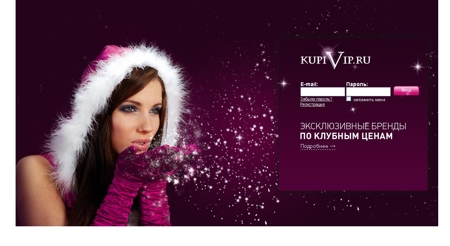In the same week that Fab snapped up UK design site Llustre and set its sights on more European expansion, some growth news from another big online fashion commerce player: KupiVIP, the Gilt Groupe of Russia, has raised another $38 million in funding to help fuel a business that CEO and co-founder Oskar Hartmann told TechCrunch is on track to make $200 million in net sales this year, on revenues of $300 million.
The round was led by Intel Capital, with participation from new investors Acton Capital Partners and the European Bank of Reconstruction, as well as existing investors Balderton Capital and Accel Partners, and will be used to expand the company’s business in Russia and the CIS. That will include the launch of more websites to complement KupiVIP’s flash sales site, luxury goods site, full-price sales site, and white-label business; as well as expanding its logistics business.
“We have only just started to exploit the enormous opportunity the Russian consumer market offers to international brands. With this new investment, we are delighted to get the support we need to build a world class e-commerce company,” said Hartmann in a statement announcing the new funding.
This newest round comes about 14 months after the company announced a $55 million round, which still holds the record as the largest-ever investment in a Russian e-commerce company; bringing the total now raised by the company to a whopping $104 million.
Hartmann in April said the company was eying up an IPO possibly in the next two years, although those plans may be put on hold in the current climate of other Russian companies like Vkontakte (the Russian Facebook) delaying IPO plans in the wake of Facebook’s lackluster performance.
This newest raise could help KupiVIP continue to grow in the meantime, and shore up against competitors like Ozon, known as the “Amazon of Russia” for the range of products it offers and sheer size.
But even with $104 million in backing, KupiVIP is going to continue to focus on its long-standing strategy to focus on Russia and adjacent markets — which include also includes non-Russian countries like Turkey. “Russia is now the largest internet market in Europe with a population the same size as England, Germany and France put together. There is huge opportunity in building out the company in that market alone, so that remains the core focus,” said Dharmash Mistry, a partner from Balderton who is a board member at KupiVIP.
KupiVIP, which, like Gilt, started as a flash-sales site selling finite numbers of fashion pieces for a reduced price, has expanded over the years catering to a rising middle class of Russians with disposable income, Internet connections, and a strong appetite for shopping and fashion. Its properties now also include KupiLuxe, dedicated to high-end luxury goods; ShopTime, a full-priced e-commerce fashion site; and a white-label e-commerce service for specific brands — which has worked with companies like Adidas and Mexx, which had been trying to crack the Russian market with their own e-commerce endeavors but less successfully.
Hartmann told me earlier this year that the company plans to have 23 such white-label sites on the books by the end of this year.
The other big area that KupiVIP is pushing, like Amazon and other big e-commerce players, is the logistics that underpins the online sales, with some of today’s $38 million going towards a new, 20,000 square-meter warehouse.
Logistics, which KupiVIP manages for itself as well as its white-label partners (and potentially others), is especially important in a country like Russia, which doesn’t have as reliable a postal service and a generally poor logistics operation compared to more developed countries, and similarly much less developed non-cash payment services. KupiVIP not only owns and manages its own warehouses and fleet of vehicles but it operates on a cash-on-delivery basis with its driver-employees collecting payment for goods only when the recipient tries on and accepts the items. It’s almost the kind of operation that makes KupiVIP a potential acquisition target for non-Russian players looking to get more involved in the Russian market.
“I think logistics is a huge competitive advantage and a huge barrier to entry in the Russian market,” said Balderton’s Mistry.
The company is on track to make revenues this year of $300 million, and projects that it will be pulling in $1 billion annually within the next five years. As I’ve pointed out before, that’s a far way from Amazon’s $48 billion in 2011 but in a fast-growing market like Russia it’s one to watch.
